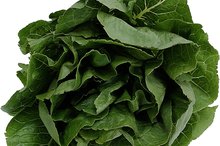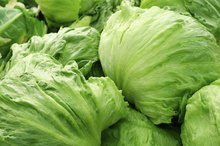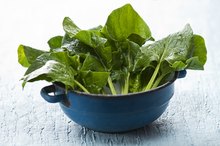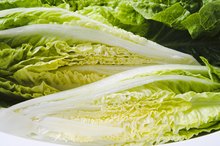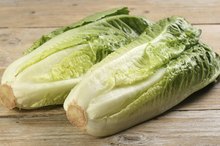Can Spinach Thin Your Blood?
Spinach supplies your body with an abundance of nutrients without adding excess calories to your diet. One cup of raw spinach contains seven calories. Spinach does not contain substances that thin your blood, although one nutrient in this leafy green vegetable may thicken your blood. This property may interact with blood thinner medications, making it important to discuss your diet with your doctor.
Spinach
Spinach comes in numerous varieties, such as baby, smooth-leaf, semi-savoy and savoy. This nutritious leafy vegetable is a common ingredient in many dishes, including salads, sandwiches, side dishes and main courses. You may prepare spinach by sautéing, steaming, microwaving, or simply washing the leaves. Spinach is a cool-season vegetable that grows best during the spring or fall seasons, although you can usually find spinach in your grocery store throughout the year.
- Spinach comes in numerous varieties, such as baby, smooth-leaf, semi-savoy and savoy.
- This nutritious leafy vegetable is a common ingredient in many dishes, including salads, sandwiches, side dishes and main courses.
Nutrients
The Difference in Nutrients Between Collard Greens and Spinach
Learn More
Spinach is a rich source of several nutrients, especially vitamin A. This leafy green vegetable contains vitamin A in the form of beta-carotene, an antioxidant in the carotenoids family. Your body uses this form of vitamin A to support the health of your eyes, immune system, skin and bones. One cup of raw spinach contains 1,688 mcg of beta-carotene, as well as 8.4 mg of vitamin C and 58 mcg of folate. It also supplies your body with almost 245 mcg of vitamin K, the nutrient that plays a role in blood clotting.
- Spinach is a rich source of several nutrients, especially vitamin A.
- This leafy green vegetable contains vitamin A in the form of beta-carotene, an antioxidant in the carotenoids family.
- It also supplies your body with almost 245 mcg of vitamin K, the nutrient that plays a role in blood clotting.
Vitamin K
Vitamin K is a fat-soluble vitamin that helps to create the proteins responsible for blood coagulation. A vitamin K deficiency can lead to thin blood that takes a long time to clot, possibly resulting in excessive blood loss from accidents and injuries. Very few people experience serious vitamin K deficiencies. The recommended daily intake of vitamin K for men is 120 mcg per day, and 90 mcg for women.
- Vitamin K is a fat-soluble vitamin that helps to create the proteins responsible for blood coagulation.
- A vitamin K deficiency can lead to thin blood that takes a long time to clot, possibly resulting in excessive blood loss from accidents and injuries.
Precautions
Calories in Spinach Pasta
Learn More
The University of Maryland Medical Center warns that you should not eat foods with a high concentration of vitamin K while taking warfarin, a type of medication that thins your blood 3. The vitamin K in spinach may interfere with the medication, counteracting the anti-clotting properties and rendering it ineffective.
Related Articles
References
- University of Florida Extension; Facts About Vitamin K; R. Elaine Turner and Wendy J. Dahl
- University of the District of Columbia Extension: Spinach
- University of Maryland Medical Center: Vitamin K
- Spinach. FoodData Central. U.S. Department of Agriculture. Updated December 6, 2019.
- Vitamin A fact sheet for health professionals. National Institutes of Health. Office of Dietary Supplements. Updated 2020.
- Nour M, Lutze SA, Grech A, Allman-Farinelli M. The relationship between vegetable intake and weight outcomes: A systematic review of cohort studies. Nutrients. 2018;10(11). doi:10.3390/nu10111626
- Vaňková K, Marková I, Jašprová J, et al. Chlorophyll-mediated changes in the redox status of pancreatic cancer cells are associated with its anticancer effects. Oxid Med Cell Longev. 2018;2018:4069167. doi:10.1155/2018/4069167
- Park SY, Na SY, Kim JH, Cho S, Lee JH. Iron plays a certain role in patterned hair loss. J Korean Med Sci. 2013;28(6):934-8. doi: 10.3346/jkms.2013.28.6.934
- Iron fact sheet for health professionals. National Institutes of Health. Office of Dietary Supplements. Updated 2019.
- Vitamin K fact sheet for health professionals. National Institutes of Health. Office of Dietary Supplements. Updated 2020.
- Food allergy overview. American Academy of Allergy, Asthma & Immunology. Updated 2020.
- Park JN, Lee JS, Noh MY, Sung MK. Association between usual vitamin K intake and anticoagulation in patients under warfarin therapy. Clin Nutr Res. 2015;4(4):235-41. doi:10.7762/cnr.2015.4.4.235
- Pendick D. 5 steps for preventing kidney stones. Harvard Health Publishing. Harvard Medical School. Updated 2013.
- Spinach. University of Illinois Extension. Watch Your Garden Grow. Updated 2020.
- Colorado spinach. Colorado Farm to Table. Colorado State University Extension. Updated 2017.
- Vegetable blanching directions and times for home freezer storage. The University of Minnesota Extension. Updated 2018.
Writer Bio
Laura Wallace Henderson, a professional freelance writer, began writing in 1989. Her articles appear online at Biz Mojo, Walden University and various other websites. She has served as the co-editor for "Kansas Women: Focus on Health." She continues to empower and encourage women everywhere by promoting health, career growth and business management skills.
